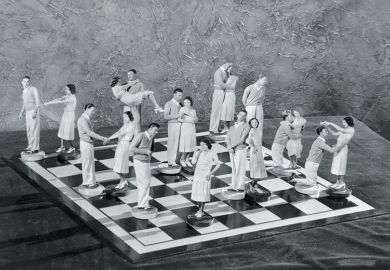Not All Dead White Men is one of the first books to examine the online formation known as the Red Pill. For the uninitiated, the Red Pill – also known as the manosphere – encompasses a variety of factions, including men’s rights activists, pickup artists (PUAs) and Men Going Their Own Way, with further links to the alt-right. What unites these disparate groups is a belief that contemporary society operates in favour of women and to the disadvantage of men.
Because she is a classicist, Donna Zuckerberg’s way in to this topic is necessarily particular, as she examines how Red Pill thinkers position themselves as “true inheritors” of the classical tradition. She states at the outset that, while Red Pill engagement with the ancient world is often superficial, her purpose is not to correct misinterpretations or set out more sophisticated expositions. Instead, she proposes to examine the “deeper ideological purpose of classical appropriation”.
The resulting analysis usefully elucidates the identitarian strains of Red Pill thinking, with Western Classics valued not so much for their content as for the fact that they are Western and classical. Yet this is not to say that content is unimportant, as these texts provide a “deep well of ancient misogyny” that manosphere authors draw on to support their reactionary gender politics.
For a non-classicist, one of the most educative aspects of the book is just how deep this well goes, as Zuckerberg faithfully reproduces passages of ancient texts that seem to revel in woman-hating. The parallels between this kind of sexist screed and the misogynistic bile that pervades contemporary discourse are striking. And yet the ultimate effect of this comparative frame is a curiously ahistorical account of misogyny.
To be sure, Zuckerberg highlights significant differences between the gender order of antiquity and that of the contemporary US. Nevertheless, with little attention given to more recent historical developments, it is as though there is not much separating the ancient world from that of today. As a result, misogyny is cast as an immovable force – which is certainly how it often feels.
Having myself researched the seduction community – whose participants are often labelled pickup artists, one of the key factions in Zuckerberg’s analysis – I must admit that I came to the book somewhat sceptical as to the centrality of classical texts to modern seduction practice. In almost a decade of research, I cannot recall more than a passing reference to Ovid’s Ars Amatoria, a Roman guide to seduction that Zuckerberg portrays as a PUA touchstone.
While this may be a function of methodological difference – Zuckerberg has undertaken a reception study, whereas I conducted ethnography – it also suggests that coming to the manosphere as a classicist may have produced its own kind of distortion. Although her analysis has much to commend it, readers may be led to believe that ancient texts provide the philosophical foundations of the manosphere, when in reality a variety of intellectual traditions inform Red Pill thinking.
Even recognising these methodological differences, there were places where I felt Zuckerberg might be overstating her case. Discussing the sexual politics of the manosphere, she argues that figures such as Daryush Valizadeh – better known as Roosh V – want to restore the “sexual politics of classical antiquity”. As evidence, she cites his call to reverse women’s suffrage. However, female disenfranchisement takes us back only to the 1920s in the US. Thus, while it is clear that Valizadeh’s political programme centres around the restoration of patriarchy – his website is called “Return of Kings” – it is not necessarily the case that this is the patriarchy of ancient Rome and Greece.
Faced with such retrograde attitudes, nitpicking over the precise time period to which Red Pill ideologues would like to return might seem to miss the point. Yet while reading this book, I often had the impression that Zuckerberg was writing for an audience that already agreed with her. Readers are continually positioned as part of an enlightened collective whose disdain for the manosphere is assumed. Those who frequent the Red Pill exist only in the two-dimensional form of their online avatars. There is little interest in the human stories that underlie the noxious forms of cathexis that the manosphere produces and exploits, nor in the economic and political shifts that precipitated its emergence and ascendancy.
To be clear, I have no interest in defending the manosphere. However, if feminist scholars want to counter the Red Pill, we need to do much more than examine its rhetorical manoeuvrings. But perhaps this is not Zuckerberg’s goal. For although she is contemptuous of Red Pill ideology, she is not especially worried about its wider import. Indeed, she describes the manosphere as a “fundamentally countercultural movement” whose “numbers are too few and their views too extreme…to have any significant political impact”. To my mind, this dangerously underplays the extent to which the manosphere reflects and reproduces more widely held attitudes and beliefs.
For example, Zuckerberg discusses the Red Pill “obsession” with false rape allegations, framed in manosphere discourse as more egregious than rape itself. But surely the constant clamouring over the potential of false allegations to ruin lives demonstrates that this is a more general preoccupation, rather than one specific to the manosphere? As for the Red Pill contention that “society as a whole would benefit if men were given responsibility for making all decisions for women”, again, is this not already something of a reality in the US, encapsulated in the image of a male president, surrounded by male politicians, signing legislation to curtail women’s reproductive decision-making?
Zuckerberg’s framing of the manosphere as a safely contained, if unpalatable, entity papers over the extent to which the American public continues to be divided on issues of sexual politics. Yet while I take issue with the conclusions she draws, I appreciate Zuckerberg’s willingness to subject the manosphere to scrutiny because there is currently all too little scholarship on this subject.
There are several reasons for this. For one, there is the difficulty of the work itself. Not many scholars want to undertake such emotionally taxing research, not least in the era of accelerated academia. The most likely candidates to do this kind of work, graduate students, are also among the most vulnerable. Then there is the difficulty of getting the subject matter taken seriously: terms such as “manosphere” sound faintly ridiculous, so institutional support might prove elusive. Even if these practical exigencies can be surmounted, there is the ever-present fear of retaliation, of being trolled, doxed, swatted – something with which Zuckerberg is, sadly, all too familiar. And alongside the fear of reprisal is the fear of recrimination, as attempts at understanding are all too easily cast as apologism.
But unless we accept the idea that some men just hate women – that misogyny really is an immovable force – then we need to understand what draws men to the manosphere. In doing so, it seems crucial to acknowledge the long prehistory of the Red Pill, as embodied by the many analogue men’s movements that preceded it. Close consideration must also be given to the technological affordances through which misogyny becomes networked, and the regimes of algorithmic amplification that profit from political polarisation. Ultimately, if we are to counteract the manosphere’s most pernicious effects, we need to interrogate its psychic force and social significance as much as its philosophical posturing.
Rachel O’Neill is a fellow in media and communications at the London School of Economics and the author of Seduction: Men, Masculinity and Mediated Intimacy (2018).
Not All Dead White Men: Classics and Misogyny in the Digital Age
By Donna Zuckerberg
Harvard University Press
288pp, £20.00
ISBN 9780674975552
Published 26 October 2018
The author
Donna Zuckerberg grew up just north of New York City and studied at the University of Chicago because she “wanted a Great Books-heavy education…The teaching there was very focused on how to analyse and deconstruct the arguments in texts, which I’ve found to be a useful skill in many areas of my life.”
After completing a PhD on Greek tragedy at Princeton University in 2014, Zuckerberg “wasn’t sure that I would continue to be a professional classicist, since I’m pretty firmly rooted in northern California and that severely limits my job market options”. Although she sometimes teaches on the Stanford Continuing Studies programme, she does not have a faculty position and notes that “it can be scary not to have the protection and support that an institution offers, which ranges from giving you access to online databases to providing resources if you’re being targeted for harassment”.
Instead, however, Zuckerberg found herself reflecting on “why I thought it was important or useful to study this field. Those questions led me in 2015 to start [the online Classics magazine] Eidolon…Over time, I found myself increasingly drawn to questions about the role of Classics and Classics scholars in today’s very contentious political discourse.” Being independent, in Zuckerberg’s view, has been crucial to Eidolon’s success, since “we don’t have a lot of bureaucracy to deal with, so we’re free to publish whatever we want without having to worry about upsetting sponsors”.
Asked about the continuing relevance of Classics, Zuckerberg says that she’s “not certain that Classics should have a role in addressing contemporary challenges. Drawing comparisons with antiquity is rarely easy, and the lessons you can learn are never straightforward. Regardless, Classics does have a role. The Right has chosen to make championing the concept of Western Civilisation one of its main intellectual battlegrounds with the Left, and Classics is tied up closely with that construct.”
Matthew Reisz
POSTSCRIPT:
Print headline: Classic robes for a modern hatred
Register to continue
Why register?
- Registration is free and only takes a moment
- Once registered, you can read 3 articles a month
- Sign up for our newsletter
Subscribe
Or subscribe for unlimited access to:
- Unlimited access to news, views, insights & reviews
- Digital editions
- Digital access to THE’s university and college rankings analysis
Already registered or a current subscriber?







